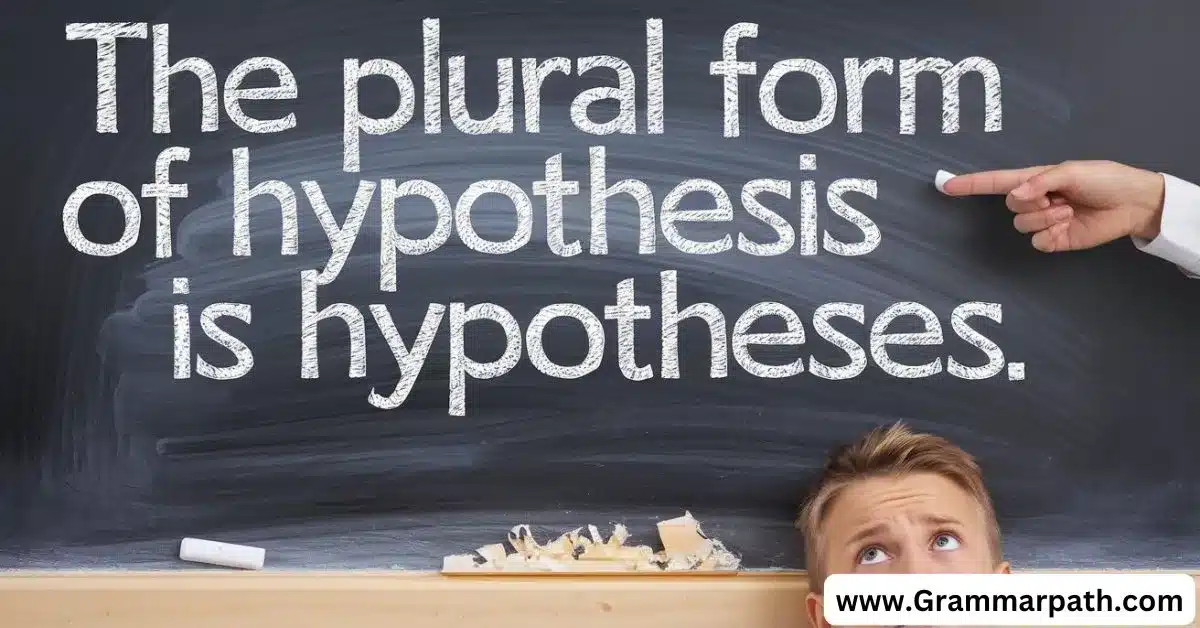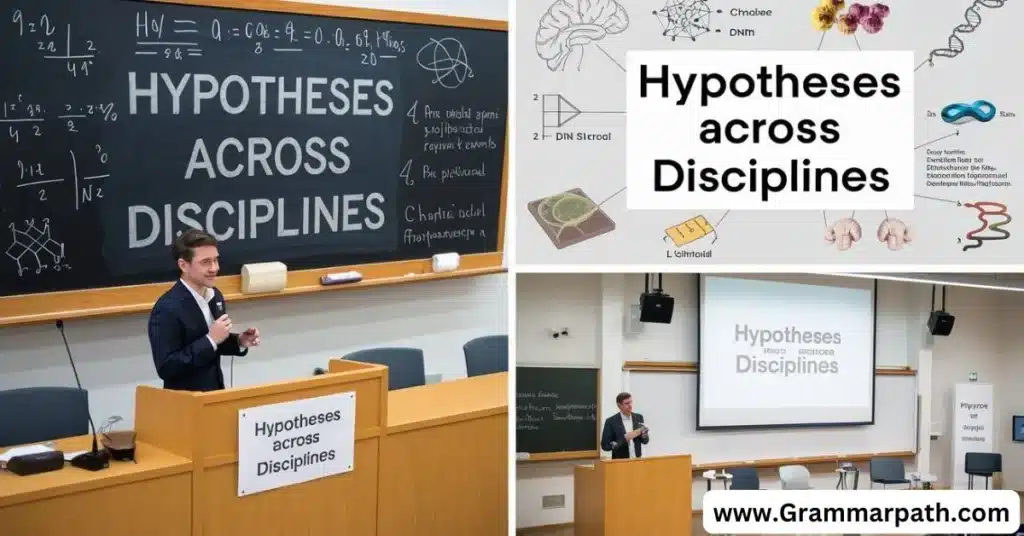
A Comprehensive Analysis of The Plural Forms of Hypothesis
Hypothesis, the cornerstone of scientific inquiry, sparks curiosity and fuels our quest for knowledge. But have you ever wondered about its plural form? This seemingly simple question opens a Pandora’s box of linguistic intrigue, revealing the fascinating complexity of language evolution.
Delving into the world of hypotheses (yes, that’s one correct plural form!) takes us on a journey through ancient Greek grammar, modern academic writing, and the ever-changing landscape of English usage. Whether you’re a seasoned researcher or a curious language enthusiast, understanding the nuances of this term’s plural forms can elevate your linguistic prowess and sharpen your communication skills.
In this comprehensive analysis, we’ll unravel the mystery surrounding the plural forms of hypothesis, exploring their origins, usage, and implications in various contexts. From scientific papers to casual conversations, mastering these forms will empower you to express your ideas with precision and confidence. So, buckle up as we embark on this linguistic adventure – you might be surprised by what you discover!
The Etymology of Hypothesis: A Greek Odyssey
To truly grasp the plural forms of hypothesis, we must first journey back to its Greek roots. The word “hypothesis” comes from the ancient Greek ὑπόθεσις (hypóthesis), composed of two parts: ὑπό (hypó), meaning “under,” and θέσις (thésis), meaning “placing” or “position.” This etymological breakdown sheds light on why the plural form isn’t as straightforward as simply adding an ‘s’ to the end.
In ancient Greek grammar, nouns ending in -sis typically form their plural by changing -sis to -ses. This pattern carried over when the word was adopted into Latin and subsequently English. Hence, the primary plural form of hypothesis becomes hypotheses, pronounced as /haɪˈpɒθəsiːz/.
However, language is a living entity, constantly evolving. While “hypotheses” remains the standard plural form in academic and scientific circles, you might encounter variations in less formal settings. Some English speakers, unfamiliar with the Greek origin, might use “hypothesises” or even “hypothesis” as a plural form. Though these aren’t considered correct in formal writing, they illustrate the fascinating way language adapts and changes over time.
The Singular and Plural Dance: When to Use Which Form
Understanding when to use the singular “hypothesis” and when to switch to the plural “hypotheses” is crucial for clear communication, especially in academic writing and scientific studies. Let’s break it down with some practical scenarios:
Singular “Hypothesis” Usage:
- When proposing a single idea or explanation to be tested
- Discussing an individual theory in a research paper
- Referring to the concept of a hypothesis in general
Plural “Hypotheses” Usage:
- Presenting multiple theories or explanations in a study
- Discussing various assumptions in a complex experiment
- Comparing different ideas across multiple scientific papers
Pro Tip: When writing a dissertation or scientific paper, consistency is key. Stick to the standard plural form “hypotheses” to maintain a professional tone and demonstrate your understanding of scientific terminology.
Here’s a handy table to illustrate the correct usage:
| Context | Singular Form | Plural Form |
|---|---|---|
| Scientific Paper | The study’s main hypothesis is… | We tested three hypotheses… |
| Email to Colleague | I have an interesting hypothesis about… | Let’s discuss our hypotheses before the meeting. |
| Casual Conversation | What’s your hypothesis on this? | These hypotheses all seem plausible. |
Mastering the Plural: Practical Examples and Scenarios
Now that we’ve covered the basics, let’s dive into some real-world examples to solidify your understanding of how to use hypothesis and hypotheses correctly. These scenarios will help you navigate various contexts, from formal academic settings to more casual interactions.
Example 1: The Scientific Paper
Dr. Emily Chen is writing a research paper on climate change. She needs to present multiple ideas for testing. Here’s how she might structure her introduction:
“This study explores three main hypotheses regarding the impact of deforestation on local climate patterns:
- Hypothesis 1: Deforestation leads to increased local temperatures.
- Hypothesis 2: Reduced forest cover alters precipitation patterns.
- Hypothesis 3: Changes in local climate due to deforestation affect biodiversity.”
Notice how Dr. Chen uses the plural “hypotheses” when referring to all three ideas collectively, but the singular “hypothesis” when listing each individual proposal.
Example 2: The Classroom Discussion
Professor James is leading a philosophy class discussion on the nature of reality. He might say:
“Today, we’ll examine various hypotheses about the nature of consciousness. Each of you will present your hypothesis, and then we’ll debate the merits of each. Remember, a strong hypothesis should be testable and falsifiable.”
Here, the professor smoothly alternates between singular and plural forms, demonstrating their correct usage in an academic setting.
Example 3: The Business Email
Sarah, a market research analyst, is emailing her team about a new project:
Subject: New Product Launch - Hypotheses Needed
Hi team,
We're gearing up for the launch of our new eco-friendly packaging line. I need everyone to come up with at least two **hypotheses** about how this might impact our sales and customer perception.
Remember, each **hypothesis** should be:
- Specific and measurable
- Based on our current market data
- Testable within our launch timeframe
Please send me your **hypotheses** by Friday. We'll review them in Monday's meeting and decide which ones to test.
Best,
SarahSarah’s email demonstrates how to use both singular and plural forms in a professional context, maintaining clarity and precision in her communication.
The Linguistic Debate: Alternative Plural Forms

While “hypotheses” stands as the standard plural form of hypothesis, the English language, known for its exceptions and irregularities, has spawned some alternative forms. These variations, though not widely accepted in formal settings, offer an intriguing glimpse into the evolution of language and the challenges of maintaining linguistic consistency.
Hypothesises: A Common Misconception
Some English speakers, particularly those unfamiliar with Greek-derived words, might instinctively add “-es” to form the plural, resulting in “hypothesises.” While this follows the pattern of many English words (e.g., bus → buses), it’s not considered correct for “hypothesis.”
Example:
Incorrect: “The researchers proposed several hypothesises to explain the unexpected results.”
Correct: “The researchers proposed several hypotheses to explain the unexpected results.”
Hypothesis as a Plural: The Unchanging Form
In some informal contexts, you might encounter “hypothesis” used as both singular and plural, similar to words like “sheep” or “deer.” This usage, while not standard, highlights the complexity of English pluralization rules.
Example of non-standard usage:
“The team came up with five different hypothesis to test.”
Correct version:
“The team came up with five different hypotheses to test.”
Navigating Academic and Professional Writing
For language enthusiasts and professionals engaged in academic study or scholarly writing, mastering the correct plural form of hypothesis is crucial. Here are some tips to ensure you always use the right form:
- Remember the Greek connection: Linking “hypothesis” to its Greek origin can help you recall the correct plural form.
- Practice makes perfect: Regularly use “hypotheses” in your writing and speech to make it feel natural.
- Proofread carefully: When reviewing your work, pay special attention to plural forms of Greek-derived words.
- Use writing tools: Many grammar checkers can catch incorrect plural forms, but don’t rely on them exclusively.
- Read extensively: Exposure to academic texts will reinforce correct usage.
The Broader Context: Greek-Derived Words in English
Understanding the plural form of hypothesis opens the door to a fascinating aspect of the English language: the incorporation of Greek-derived words. This knowledge can enhance your overall linguistic prowess and help you navigate similar terms in academic writing and beyond.
Here are some other Greek-derived words with similar plural formations:
- Analysis → Analyses
- Crisis → Crises
- Basis → Bases
- Thesis → Theses
- Parenthesis → Parentheses
Mastering these plural forms showcases your attention to detail and understanding of language nuances, particularly valuable in scientific study and scholarly contexts.
Practical Applications: From Lab Reports to Literature Reviews

The correct use of “hypothesis” and “hypotheses” extends beyond mere grammatical correctness; it’s a fundamental skill for anyone engaged in research, academic writing, or scientific communication. Let’s explore how this knowledge applies in various scenarios:
Writing a Research Proposal
When crafting a research proposal, clearly stating your hypothesis (or hypotheses) is crucial. For example:
“This study will test the following hypotheses:
- Online learning platforms increase student engagement.
- Virtual reality tools enhance retention of complex concepts.
- Gamification elements in educational software improve learning outcomes.”
Conducting a Literature Review
In a literature review, you’ll often need to discuss multiple hypotheses from various studies. For instance:
“Smith et al. (2020) proposed three hypotheses regarding climate change’s impact on marine ecosystems. Their primary hypothesis suggested that rising ocean temperatures would lead to coral bleaching events.”
Presenting Research Findings

When presenting your research, clearly distinguishing between singular and plural forms helps your audience follow your logic:
“Our initial hypothesis was partially supported by the data. However, further analysis led us to develop two additional hypotheses that better explain the observed phenomena.”
The Evolution of Scientific Language
The journey of “hypothesis” from ancient Greek to modern English reflects the broader evolution of scientific language. As our understanding of the world grows more complex, so too does the terminology we use to describe it. The precision required in forming the plural “hypotheses” mirrors the precision demanded in scientific inquiry itself.
Consider how the use of hypotheses has changed over time:
- In ancient Greek philosophy, a hypothesis was often a starting point for a logical argument.
- During the Scientific Revolution, the concept of a testable hypothesis became central to the scientific method.
- In modern research, multiple competing hypotheses are often proposed and tested simultaneously.
This evolution underscores the importance of language in shaping our approach to knowledge and discovery.
Enhancing Your Writing Skills
Mastering the plural forms of hypothesis isn’t just about correctness; it’s about enhancing your overall writing skills. Here are some ways this knowledge can elevate your writing:
- Precision: Using the correct form demonstrates attention to detail and precision in thought.
- Credibility: In academic circles, correct usage enhances your credibility as a researcher or writer.
- Clarity: Proper use of singular and plural forms clarifies your ideas, especially when discussing multiple theories.
- Versatility: Understanding Greek-derived plurals improves your ability to handle complex terminology across various fields.
Common Pitfalls and How to Avoid Them
Even experienced writers can stumble when it comes to the plural of hypothesis. Here are some common mistakes and tips to avoid them:
- Overuse of the plural: Not every situation calls for the plural form. Use “hypothesis” when discussing a single idea.
- Inconsistency: Stick to “hypotheses” throughout your document for the plural form.
- Pronunciation challenges: Practice saying “hypotheses” (/haɪˈpɒθəsiːz/) to gain confidence in verbal presentations.
- Context confusion: Remember that in general discussion, “hypothesis” might be used more loosely, but in academic writing, precision is key.
Hypotheses Across Disciplines

While we often associate hypotheses with hard sciences, they play crucial roles across various fields. Let’s explore how different disciplines approach hypothesis formation:
In Psychology
Psychologists use hypotheses to explore human behavior and mental processes. For example:
“Exposure to nature scenes for 30 minutes daily will reduce stress levels in urban office workers, as measured by cortisol levels and self-reported stress scales.”
In Economics
Economists form hypotheses about market behaviors and economic trends:
“Implementing a four-day work week will increase overall productivity and job satisfaction while reducing operational costs for companies with over 500 employees.”
In Literature
Even in literary studies, scholars form hypotheses about textual interpretations or author intentions:
“The recurring moth imagery in Virginia Woolf’s works symbolizes the fragility of human consciousness and the ephemeral nature of life.”
From Hypothesis to Theory: The Scientific Journey
Understanding the plural “hypotheses” is just the beginning. Let’s explore how multiple hypotheses contribute to the development of scientific theories:
- Initial Observation: Scientists notice a phenomenon or pattern.
- Hypothesis Formation: They form one or more hypotheses to explain the observation.
- Experimentation: Researchers design and conduct experiments to test these hypotheses.
- Data Analysis: Results are analyzed to support or refute the hypotheses.
- Refinement: Based on results, hypotheses are refined or new ones are formed.
- Replication: Other scientists attempt to replicate the results.
- Theory Development: After extensive testing and validation of multiple hypotheses, a theory may emerge.
This process underscores the importance of formulating clear, testable hypotheses and understanding when to use singular or plural forms in scientific writing.
Hypotheses in the Digital Age
The digital revolution has transformed how we form and test hypotheses across various fields:
Big Data and Hypothesis Testing
With access to vast amounts of data, researchers can now test multiple hypotheses simultaneously, leading to more robust findings. For instance, in a study on online consumer behavior:
“We analyzed user data from 1 million e-commerce transactions to test five hypotheses about the impact of website design elements on purchase decisions.”
AI and Hypothesis Generation
Artificial Intelligence is now capable of generating hypotheses based on pattern recognition in large datasets. This has led to a new field called “automated science,” where AI suggests hypotheses for human scientists to investigate.
Communicating Hypotheses Effectively

Whether you’re presenting to peers, writing a paper, or explaining your research to the public, clear communication of your hypotheses is crucial:
- Use plain language: While maintaining precision, try to explain your hypotheses in terms a non-expert can understand.
- Provide context: Explain why your hypotheses are important and how they fit into the broader field of study.
- Visualize when possible: Use diagrams or flowcharts to illustrate complex hypotheses.
- Be transparent about limitations: Acknowledge any assumptions or constraints in your hypotheses.
Conclusion
In conclusion, understanding the plural forms of hypothesis is more than a grammatical exercise; it’s a gateway to precise communication in the world of science and beyond. Whether you’re writing a dissertation, engaging in a scholarly debate, or simply satisfying your curiosity about language, this knowledge empowers you to express complex ideas with clarity and confidence.
Remember, language is a tool for conveying thoughts and ideas. By mastering nuances like the correct plural of hypothesis, you sharpen this tool, making your communication more effective and your ideas more impactful. So embrace the beauty of “hypotheses,” and let it elevate your writing and thinking to new heights.

Emily Olivia is an experienced writer specializing in grammar and English language topics. With a passion for clarity and precision, she shares valuable insights on synonyms, grammar rules, and writing tips to help readers enhance their language skills on Grammar Path.





